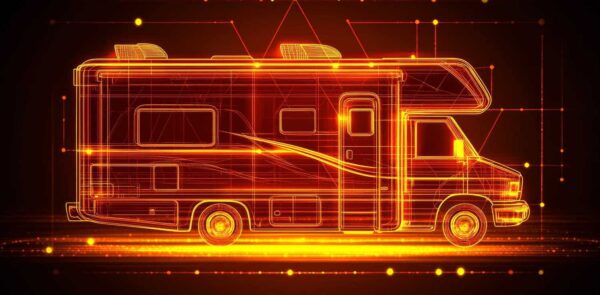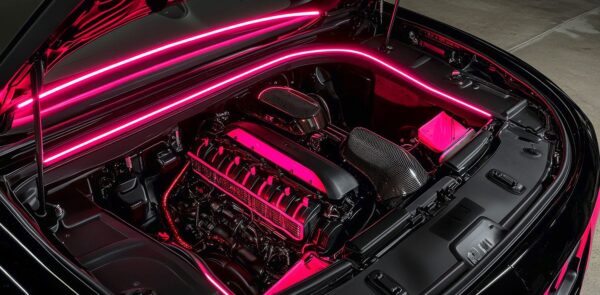
Jump to a section:
The automotive industry has undergone dramatic transformation in 2025, with dealerships facing unprecedented challenges from digital-first consumer behaviors, supply chain disruptions, and evolving vehicle technologies. Modern car buyers conduct 95% of their research online before visiting dealerships, spending an average of 14 hours in digital channels and visiting 4.2 websites during their purchasing process. With franchised dealerships generating over $1.2 trillion in sales annually while competing for increasingly informed and selective customers, developing comprehensive marketing strategies that integrate traditional relationship-building with sophisticated digital approaches has become essential for sustainable success.
Comprehensive Automotive Marketing Strategy Development
Successful automotive marketing in 2025 requires integrated strategies that seamlessly blend digital innovation with traditional relationship-building approaches to create comprehensive customer experiences. Modern automotive marketing strategies must address multiple touchpoints throughout extended purchase journeys while maintaining consistent messaging and value propositions across all channels. Research demonstrates that dealerships implementing omnichannel marketing strategies report 23% higher customer satisfaction rates and 31% better lead conversion compared to single-channel approaches.
Data-driven segmentation forms the foundation of effective automotive marketing strategies, enabling personalized messaging that resonates with specific customer demographics and purchase behaviors. Advanced customer relationship management (CRM) systems allow dealerships to track prospect interactions across multiple touchpoints while identifying optimal timing for marketing outreach based on predictive analytics. Successful segmentation strategies consider factors including vehicle preferences, price sensitivity, financing needs, and geographic location to deliver relevant offers that increase engagement and conversion rates.
Omnichannel integration ensures consistent brand experiences whether customers interact through websites, social media, email campaigns, or in-person dealership visits. This integration requires sophisticated technology platforms that synchronize customer data, inventory information, and marketing messaging across all channels while enabling sales teams to access complete interaction histories. Dealerships with effective omnichannel strategies report 15% higher customer lifetime value and significantly reduced sales cycle lengths due to improved information continuity.
Performance measurement and optimization systems enable continuous strategy refinement based on real-world results rather than assumptions about customer behavior. Modern automotive marketing analytics platforms track customer journeys from initial awareness through post-purchase service relationships, identifying which channels and messages drive actual vehicle sales rather than simple engagement metrics. This data-driven approach helps dealerships allocate marketing budgets more effectively while identifying opportunities for improvement across all customer touchpoints.
“The automotive marketing strategies that succeed in 2025 are those that understand modern consumers expect seamless experiences that combine digital convenience with personal service. Success requires technology integration that enhances rather than replaces human relationships while providing the information and efficiency that today’s buyers demand.” – Strategy Team at LinchpinSEO
Essential Components of Modern Automotive Marketing Strategy
| Strategy Component | Implementation Focus | Expected Results | Key Performance Indicators |
|---|---|---|---|
| Customer Segmentation | CRM-based behavioral analysis and personalization | 31% better lead conversion rates | Segment engagement rates, conversion by persona |
| Omnichannel Integration | Unified data platforms and consistent messaging | 15% higher customer lifetime value | Cross-channel engagement, journey completion rates |
| Digital-Physical Alignment | Seamless online-to-dealership experiences | 23% higher customer satisfaction | Lead quality scores, sales conversion rates |
| Performance Analytics | ROI tracking and continuous optimization | 20% improvement in marketing efficiency | Cost per lead, customer acquisition costs, LTV |
Advanced Digital Marketing and SEO Optimization
Digital marketing has become the primary driver of automotive lead generation, with 76% of car buyers running searches before making purchases and digital advertising spending reaching $6.9 billion in 2025. Search engine optimization (SEO) delivers the highest long-term ROI in automotive marketing, with organic traffic accounting for 53% of website visits and conversion rates averaging 1.57% for the automotive industry. Successful dealership SEO strategies focus on local search optimization, inventory-specific content, and technical website improvements that enhance user experience while improving search engine visibility.
Local SEO optimization becomes crucial for automotive dealerships as most car purchases occur within geographic proximity to buyers’ locations. This involves optimizing Google Business Profile listings, building location-specific content, and establishing consistent NAP (Name, Address, Phone) information across all online directories. Dealerships with strong local SEO presence report 40% more qualified leads from organic search compared to those without optimized local presence. Advanced local SEO includes inventory-specific landing pages that target vehicle make, model, and year combinations with local geographic modifiers.
Pay-per-click (PPC) advertising provides immediate visibility for high-intent automotive searches while complementing longer-term SEO efforts. Automotive PPC campaigns achieve average click-through rates of 8.77% for vehicle sales and conversion rates of 5.72%, significantly outperforming most other industries. Successful PPC strategies utilize dynamic inventory feeds that automatically create ads for available vehicles while incorporating negative keywords that filter out unqualified traffic. Advanced campaigns use audience segmentation and retargeting to reach previous website visitors with relevant vehicle offers and incentives.
Content marketing establishes dealership expertise while supporting both SEO and customer education objectives throughout extended automotive purchase processes. Effective automotive content addresses common buyer questions, compares vehicle features, and explains financing options in formats that support decision-making. Video content particularly influences 40% of car shoppers to consider new vehicles, with watch time for test drive videos growing 65% in recent years. Successful content strategies produce regular blog posts, vehicle reviews, how-to guides, and maintenance tips that attract and nurture prospects over time.
Digital Marketing Channel Performance and Optimization Strategies:
- Local SEO Optimization: Google Business Profile enhancement, local content creation, and directory management
- PPC Campaign Management: Dynamic inventory feeds, audience targeting, and conversion optimization
- Content Marketing Development: Educational resources, video content, and buyer journey support
- Social Media Advertising: Platform-specific campaigns leveraging visual inventory showcasing
- Email Marketing Automation: Lead nurturing sequences and customer retention campaigns
Proven Sales Techniques and Customer Engagement Strategies
Modern automotive sales success requires sophisticated relationship-building techniques that address informed buyers who arrive at dealerships with extensive research and specific expectations. Today’s car buyers expect transparency, efficiency, and consultative approaches that focus on their needs rather than aggressive closing techniques. Sales professionals who master consultative selling approaches report 25% higher closing rates and significantly better customer satisfaction scores compared to traditional high-pressure tactics.
Active listening and needs assessment form the foundation of effective automotive sales, enabling sales representatives to understand customer priorities, constraints, and decision-making processes before making recommendations. This involves asking open-ended questions about vehicle usage, family needs, budget considerations, and lifestyle factors that influence vehicle selection. Successful sales professionals spend 60-70% of initial conversations gathering information and building relationships rather than immediately presenting vehicle features and benefits.
Product knowledge and expertise demonstration build credibility while helping customers understand vehicle value propositions and competitive advantages. Modern car buyers expect sales representatives to provide detailed information about safety ratings, fuel efficiency, technology features, and maintenance costs that influence total ownership experiences. Sales professionals who combine comprehensive product knowledge with honest assessments of vehicle strengths and limitations build trust that facilitates decision-making and referral generation.
Follow-up systems and customer relationship management ensure continued engagement throughout extended automotive sales cycles while maintaining relationships that support future sales opportunities. Effective follow-up involves personalized communications that add value through relevant information, updated incentives, or answers to specific questions raised during previous interactions. Dealerships with systematic follow-up processes convert 30% more leads compared to those relying on sporadic customer contact.
Advanced Automotive Sales Techniques for Modern Buyers
| Sales Technique | Customer Benefit | Implementation Strategy | Success Metrics |
|---|---|---|---|
| Consultative Selling | Personalized vehicle recommendations | Needs assessment and active listening | 25% higher closing rates |
| Transparent Pricing | Trust building and decision confidence | Upfront pricing disclosure and explanation | Reduced negotiation time, higher satisfaction |
| Digital Integration | Seamless online-offline experience | CRM integration and digital tool usage | 30% better lead conversion |
| Value Demonstration | Understanding of total ownership benefits | Comprehensive product knowledge and comparison | Higher gross profit per unit |
Customer Loyalty and Retention Program Development
Customer loyalty in the automotive industry extends far beyond initial vehicle purchases to encompass service relationships, referral generation, and future vehicle acquisition that can span decades. Modern loyalty programs combine traditional relationship-building with sophisticated technology platforms that personalize experiences while providing measurable value to customers throughout their ownership journey. Dealerships with comprehensive loyalty programs report 40% higher customer lifetime value and 60% more referral-generated sales compared to those focusing solely on new customer acquisition.
Service-based loyalty initiatives create ongoing touchpoints that maintain customer relationships while generating revenue through maintenance, repair, and warranty services. These programs often include service reminders, priority scheduling, loyalty discounts, and exclusive events that reinforce the dealership relationship beyond the initial sale. Advanced service loyalty programs use predictive maintenance alerts and seasonal service promotions that address specific vehicle needs while demonstrating proactive customer care.
Referral programs leverage satisfied customers as advocates who introduce new prospects to the dealership through personal recommendations that carry more weight than traditional advertising. Effective referral programs provide meaningful incentives for both referrers and new customers while tracking referral sources to optimize reward structures. Studies indicate that referred customers have 25% higher lifetime value and 37% better retention rates compared to customers acquired through paid advertising.
Communication strategies maintain engagement through regular, valuable contact that goes beyond sales-focused messaging to include educational content, maintenance tips, and community involvement that builds emotional connections. Modern loyalty communications use automation platforms that personalize messaging based on vehicle ownership, service history, and demonstrated preferences while avoiding over-communication that leads to unsubscribes.
Comprehensive Customer Loyalty Program Components:
- Service Loyalty Benefits: Priority scheduling, exclusive discounts, and maintenance packages
- Referral Reward Systems: Incentives for customer advocacy and new customer introductions
- Exclusive Events and Experiences: VIP access to new model launches and automotive events
- Personalized Communication: Tailored messaging based on ownership history and preferences
- Future Purchase Incentives: Early access to new models and loyalty pricing programs
Technology Integration and CRM Optimization
Automotive customer relationship management (CRM) systems have evolved beyond basic contact management to encompass comprehensive platforms that integrate inventory management, marketing automation, sales processes, and customer service functions. Modern dealership CRM platforms provide unified views of customer interactions across all touchpoints while enabling predictive analytics that guide timing and personalization of marketing outreach. Dealerships using advanced CRM systems report 35% improvement in lead conversion rates and 28% reduction in sales cycle lengths.
Marketing automation integration enables sophisticated lead nurturing campaigns that adapt messaging based on customer behavior, engagement patterns, and demonstrated preferences. These systems can automatically deliver relevant content, schedule follow-up communications, and alert sales teams when prospects demonstrate high purchase intent through specific actions or engagement patterns. Advanced marketing automation includes dynamic content that showcases available inventory matching customer preferences while incorporating current incentives and pricing information.
Inventory management integration ensures that marketing efforts align with available vehicles while preventing customer disappointment from outdated or inaccurate inventory information. Real-time inventory feeds enable dynamic advertising campaigns that automatically promote available vehicles while pausing ads for sold units. This integration also supports trade-in value tools and payment calculators that provide accurate information based on current inventory and financing options.
Performance analytics and reporting capabilities provide comprehensive insights into customer acquisition costs, channel effectiveness, and campaign ROI that guide strategic decision-making. Modern CRM platforms include customizable dashboards that track key performance indicators while providing drill-down capabilities that reveal detailed performance patterns. This data enables continuous optimization of marketing spend allocation and identification of highest-value customer segments and acquisition channels.
CRM Integration Benefits and Implementation Priorities
| Integration Area | Primary Benefits | Implementation Complexity | ROI Timeline |
|---|---|---|---|
| Marketing Automation | 35% better lead conversion, personalized nurturing | Moderate – requires workflow setup | 3-6 months |
| Inventory Management | Real-time accuracy, dynamic advertising | High – needs technical integration | 2-4 months |
| Sales Process Integration | 28% shorter sales cycles, better follow-up | Low – mostly training and process | 1-3 months |
| Analytics and Reporting | Data-driven decisions, improved ROI measurement | Low – built into most platforms | Immediate |
Key Trends and Strategic Action Items
Current Automotive Marketing Trends and Strategic Responses
| Key Trends | Strategic Action Items |
|---|---|
| 95% of car buyers research online spending average 14 hours digitally | Develop comprehensive digital content strategies that support extended research processes |
| Average dealership spends $528,923 annually on advertising with digital majority | Optimize digital marketing mix and ROI measurement across all channels |
| Organic SEO delivers highest ROI with 53% of website traffic | Prioritize local SEO optimization and content marketing for long-term growth |
| PPC achieves 8.77% CTR and 5.72% conversion rates in automotive | Implement dynamic inventory PPC campaigns with advanced targeting |
| Video content influences 40% of shoppers to consider new vehicles | Create comprehensive video marketing strategies including virtual tours and testimonials |
| Dealerships using marketing automation see 2x higher ROI | Implement CRM-integrated marketing automation for lead nurturing |
| Referral customers have 25% higher lifetime value | Develop systematic referral programs with meaningful incentives |
| Service-based loyalty programs drive 40% higher customer lifetime value | Create comprehensive service loyalty initiatives beyond vehicle sales |
| Omnichannel strategies report 31% better lead conversion | Integrate online and offline customer experiences through unified data platforms |
| Advanced CRM systems improve lead conversion by 35% | Upgrade CRM capabilities to include predictive analytics and automation |
Conclusion
Success in automotive marketing requires sophisticated integration of digital innovation with traditional relationship-building approaches that address modern consumer expectations while driving measurable business results. The most successful dealerships in 2025 are those that understand automotive marketing as a comprehensive customer experience strategy rather than isolated promotional activities. This holistic approach combines advanced technology platforms with personalized service delivery to create competitive advantages that drive both immediate sales and long-term customer loyalty.
We recognize that implementing comprehensive automotive marketing strategies requires balancing multiple objectives including lead generation, customer experience optimization, and profitability maintenance while adapting to rapidly evolving consumer behaviors and market conditions. Success depends on systematic approaches that leverage data analytics, technology integration, and proven sales techniques to create sustainable growth rather than relying solely on promotional tactics or individual channel optimization.
The LinchpinSEO team specializes in developing comprehensive automotive marketing strategies that integrate digital marketing, sales process optimization, and customer relationship management to drive measurable results for dealerships and automotive businesses. Our expertise spans SEO optimization, PPC management, CRM implementation, and performance analytics designed specifically for the automotive industry’s unique challenges and opportunities.
Ready to transform your automotive marketing strategy and boost sales performance? Contact the LinchpinSEO team today to discuss how we can help you develop and implement comprehensive automotive marketing approaches that drive qualified leads, improve customer experiences, and build lasting relationships that fuel sustained business growth in competitive markets.


